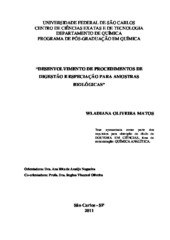Desenvolvimento de procedimentos de digestão e especiação para amostras biológicas
Abstract
In general, sample preparation is the most critical step in an analytical sequence. The development of faster, simpler, cheaper and greener procedures is required. In this work, two digestion methods for biological samples using microwave radiation have been developed. One of proposed digestion methods consist on the partial decomposition of meat tissues using PTFE micro vessels under microwave radiation. In this procedure, it was used 50 mg of sample and 50 μL of concentrated HNO3. Digestion is carried out in 7 min applying 650 W microwave power. Recoveries around 100% were obtained for determination of Ca, Cu, Fe, Mg, Mn and Zn by ICP OES, when the method was applied to bovine liver and muscle certified reference materials. The second proposed digestion method combines the use of infrared radiation with microwave radiation, which allowed the decomposition of 1 g of human food and coffee samples by using microwave oven cavity. Recoveries around 80-100% were reached in the determination of Al, Ca, Cu, Fe, Mg, Mn and Zn by ICP OES in certified reference materials. Another part of the thesis work was dedicated to the study of selenium fractionation and identification of its organic and inorganic species in samples of bovine semen. Selenium presents essential role in several biological functions of mammals. Infertility in humans and animals, including bulls, is related to the lack of this element. In this context, selenium distribution in lipids, proteins and low molecular weight compounds fractions of bovine semen was evaluated. Besides, a chromatographic separation method for Se(IV), Se(VI) and selenomethionine methylselenocysteine species was developed, in order to identify these species in a semen bovine sample.
